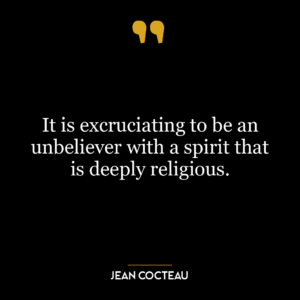This quote suggests that religion, according to the speaker, can sometimes act as a constraint or a limitation on a person’s life. It implies that when a person is free from the doctrines and dogmas of religion, they are more likely to live a life that is balanced, healthy, and normal according to their own terms and definitions.
The quote is not necessarily an attack on religion, but rather a commentary on the potential restrictions it can impose on individual freedom and personal growth. It suggests that without the moral and behavioral prescriptions often associated with religion, a person might have a better chance to explore their own values, make their own choices, and ultimately, lead a life that is more true to their own personal desires and aspirations.
Applying this idea to today’s world, one might argue that societies have become more accepting of diverse lifestyles and beliefs, and less bound by traditional religious doctrines. This shift has arguably allowed for greater individual freedom and personal development. People are more free to choose their own paths in life, without feeling compelled to adhere to a predetermined set of rules or expectations.
In terms of personal development, this quote might suggest the importance of self-discovery and personal autonomy. It underscores the significance of making choices based on one’s own values and beliefs, rather than simply following a prescribed path. In this sense, being “freed of religion” could be seen as a metaphor for breaking away from any kind of external control or influence, and embracing one’s own individuality and personal freedom.
However, it’s important to note that this doesn’t mean religion can’t be a positive force in people’s lives. Many find comfort, guidance, and a sense of community in their religious beliefs. The key, perhaps, lies in not letting any belief system hinder personal growth and the pursuit of a balanced and wholesome life.








